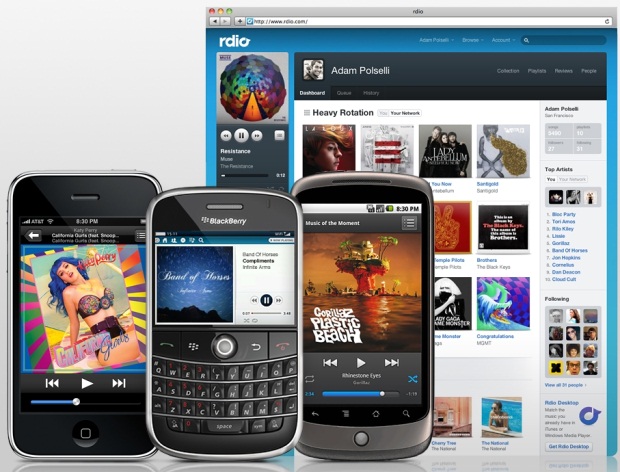
We’ve written about digital music startup Rdio a bunch in the past, starting from when we found out Kazaa, Skype and Joost founders Janus Friis and Niklas Zennstrom were involved in setting up and funding the business through their investment firm Atomico Ventures.
We noted how they were silently assembling a killer team, and took notice when an early iPhone app landed in the App Store that nobody was able to access yet.
This morning, the company finally unveiled its strategy for the first time, and opened up a preview version of the service to users in the United States on an invitation-only basis. We had a chat with Friis, CEO Drew Larner and COO Carter Adamson about the idea behind the service, the business model, future plans and some history.
Adamson explained to me that Rdio was born out of necessity. The founding members of the company looked around the digital music space and saw a lot of shortcomings on the market, specifically in terms of pricing strategies, portability, seamless playback and social sharing abilities across devices and issues with music discovery.
Rdio aims to solve all those problems with one single service and two fixed pricing plans.
Time is ripe now, they claim, because of the increasing proliferation of capable smartphones, more stable and faster networks worldwide, people getting accustomed to all-you-can-eat pricing models and paying for applications, and so on. We’ve heard that before, of course, including from many startups who’ve tried their hand at bringing music sales and distribution into the digital age – and most have failed spectacularly in doing so.
Most of the coverage of Rdio’s launch was focused on its subscription-based model. Basically, you can gain access to more than 5 million songs online for $4.99 a month, or $9.99 a month if you also want to be able to access your music collection from your mobile device. Apps for the iPhone and BlackBerry are on the way, with an Android version also scheduled for release ‘very soon’.
The service is being launched in the US first, then Canada, the UK and parts of Western Europe later on. Management is hopeful that the international roll-out will be carried out largely before the end of this year, but declined to discuss specific launch dates.
What’s been left out of most coverage is that Rdio also doubles as an à la carte store that could potentially rival Apple’s iTunes and Amazon’s MP3 store. That means you’re also able to purchase individual songs and albums through Rdio and download them to your computer.

It will be interesting to see if Rdio can stand its ground against juggernauts like Apple and Amazon, but also other Web giants like Google, Yahoo, MySpace, Microsoft and eventually, Facebook. Not to mention the likes of Rhapsody, Spotify, Pandora, Napster, MOG and We7.
If Rdio fails and becomes another Joost rather than another Skype-like story, it won’t be because of lack of content. The company has licensing deals in place with the world’s largest music labels – EMI Music, Sony Music Entertainment, Universal Music Group and Warner Music Group – along with a number of independent aggregators of digital music.
But the unique thing about Rdio, Larner and Adamson told me, is the social element. Users will be able to not only stream and download songs, but the whole experience revolves around activity streams, which is core to the service and enables people to discover music through what their friends are listening to and buying. There’s also some basic integration with social networking services like Twitter and Facebook.
Rdio also offers recommendations much like iTunes does with Genius, by algorithmically learning which music you like to listen to. Users can also discover music by browsing category rankings and playing artist-based radio channels, which serve tunes from similar artists as well.
Also compelling is that Rdio offers a small desktop app that serves as a basic music player but also scans a user’s iTunes and Windows Media Player history. That way, Rdio can check if the music you play on your computer is available through their service based on metadata and build your catalog based on your history, so you don’t have to start from scratch. This only takes seconds, Adamson explained.
 I asked Friis if he took any lessons from his Kazaa days, which notably are almost a decade behind us. Surprisingly, he told me that the relations with key people from the music industry, which he developed throughout the whole litigation process and namely the settlement procedures, were key in getting Rdio off the ground in the first place.
I asked Friis if he took any lessons from his Kazaa days, which notably are almost a decade behind us. Surprisingly, he told me that the relations with key people from the music industry, which he developed throughout the whole litigation process and namely the settlement procedures, were key in getting Rdio off the ground in the first place.
In many ways, it seems like they wouldn’t have been able to seal the licensing deals that are in place now and are needed for Rdio to become a sustainable venture if it weren’t for Friis and Zennstrom’s history with Kazaa and the music labels. Funny how that goes.
Friis also took a lot of lessons away from Joost, the failed online video venture that the pair started a couple of years ago. The two businesses can not really be accurately compared apples to apples, Friis says, but he did learn a number of interesting things from the whole adventure, which he wouldn’t get into further because it would take him too much time.
Friis told me that he will divide his time between Rdio, Skype and other commitments, but that he has been and will remain closely involved with product strategy and more aspects of the business. Zennstrom will focus more attention on Atomico Ventures, although both he and Friis have personally invested in Rdio along with the (undisclosed amount of financing) that was contributed by Atomico.
Expect a full review and more screenshots of the Rdio service soon.